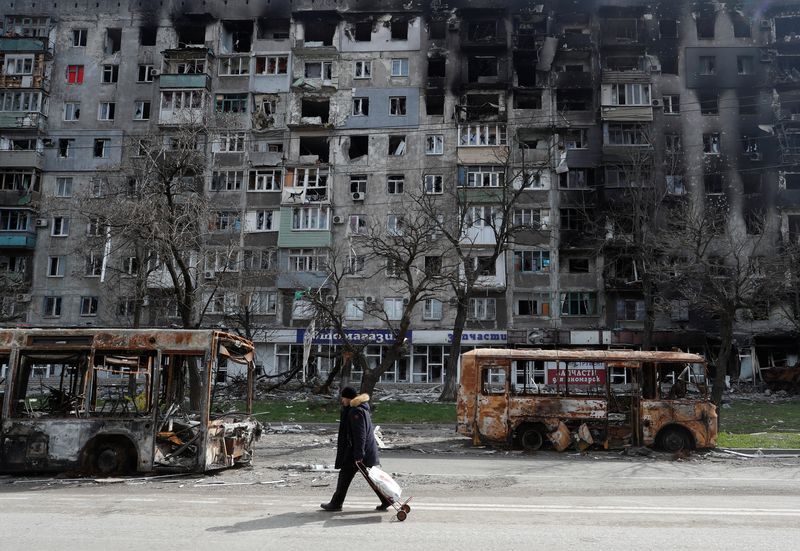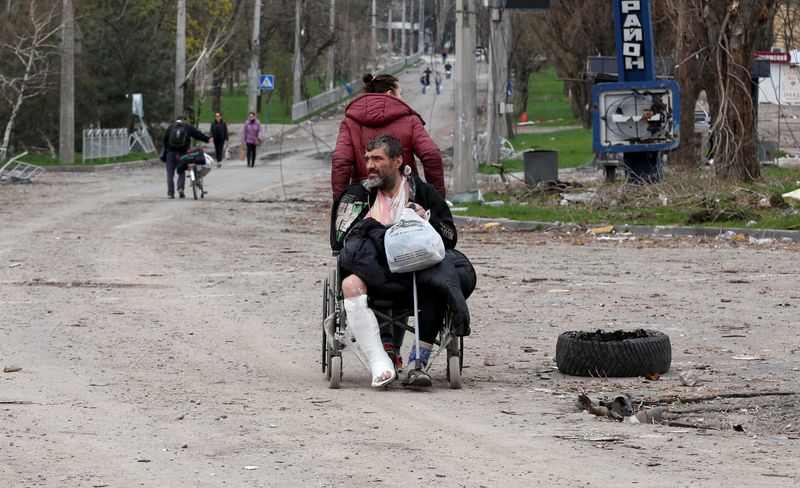By Pavel Polityuk and James Mackenzie
KYIV/KHARKIV (Reuters) - Russia was intensifying its attack on Ukraine's east on Tuesday as it seized a frontline city and sought a decisive victory in Mariupol, prompting Western governments to pledge more arms and sanctions.
Thousands of Russian troops backed by artillery and rocket barrages were advancing in what Ukrainian officials called the Battle of the Donbas.
Russia's nearly eight-week-long invasion has taken longer than many expected while still failing to capture any of the biggest cities, forcing Moscow to refocus in and around separatist regions.
The biggest attack on a European state since 1945 has, however, seen nearly 5 million people flee abroad and reduced cities to rubble as the incursion drags on.
Russia was hitting the Azovstal steel plant, the main remaining stronghold in Mariupol, with bunker-buster bombs, a Ukrainian presidential adviser said late on Tuesday. Reuters could not verify the details.
"The world watches the murder of children online and remains silent," adviser Mykhailo Podolyak wrote on Twitter (NYSE:TWTR).
After an earlier ultimatum to surrender lapsed and as midnight approached, Russia's defence ministry said not a single Ukrainian soldier had laid down their weapons and renewed the proposal. Ukrainian commanders at Azovstal have vowed not to surrender.
"Russia's armed forces, based purely on humanitarian principles, again propose that the fighters of nationalist battalions and foreign mercenaries cease their military operations from 1400 Moscow time on 20th April and lay down arms," the Russian Defence Ministry said.
The United States, Canada, Britain, France and Germany pledged more support to Ukraine.
"We will continue to provide them more ammunition, as we will provide them more military assistance," White House spokesperson Jen Psaki said, adding that new sanctions were being prepared.
"It is unfair that Ukraine still has to ask for (weapons) which have been sitting for years in the storage depots of our partners" President Volodymyr Zelenskiy said in a video address.
U.N. Secretary-General Antonio Guterres called for a four-day humanitarian pause in the fighting this coming weekend, when Orthodox Christians celebrate Easter, to allow civilians to escape and humanitarian aid to be delivered.
Russia says it launched what it calls a "special military operation" on Feb. 24 to demilitarise and "denazify" Ukraine. Kyiv and its Western allies reject that as a false pretext.
CITY CAPTURED
Ukraine said the new assault had resulted in the capture of Kreminna, an administrative centre of 18,000 people in Luhansk, one of the two Donbas provinces.
Russian forces were attacking "on all sides", authorities were trying to evacuate civilians and it was impossible to tally the civilian dead, Luhansk regional governor Serhiy Gaidai said.
In Moscow, Russian Foreign Minister Sergei Lavrov confirmed that "another stage of this operation is beginning".
Defence Minister Sergei Shoigu said Russia was "methodically" carrying out its plan to "liberate" Donetsk and Luhansk, provinces which Moscow demands Kyiv cede fully to Russian-backed separatists.
Driven back by Ukrainian forces in March from an assault on Kyiv in the north, Russia has instead poured troops into the east for the Donbas offensive. It has also made long-distance strikes at other targets including the capital.
Ukraine's top security official, Oleksiy Danilov, said Russian forces had tried to break through Ukrainian defences "along almost the entire front line of Donetsk, Luhansk and Kharkiv regions".
The coal- and steel-producing Donbas has been the focal point of Russia's campaign to destabilise Ukraine since 2014, when the Kremlin used proxies to set up separatist "people's republics" in parts of Luhansk and Donetsk provinces.
Moscow now says its aim is to capture the full provinces on the separatists' behalf. Ukraine has a large force defending northern parts of the Donbas and military experts say Russia aims to cut them off or surround them.
But Russia still needs to keep its troops supplied across miles of hostile territory. Ukraine has counter-attacked near Kharkiv in the rear of Russia's advance, apparently aiming to cut off supply lines.
SHELL-SHOCKED RESIDENTS
In Mariupol, scene of the war's heaviest fighting and worst humanitarian catastrophe, about 120 civilians living next to the sprawling steel plant left via humanitarian corridors, the Interfax news agency reported on Tuesday, quoting Russian state TV.
Mariupol has been besieged since the war's early days. Tens of thousands of residents have been trapped with no access to food or water and bodies litter the streets. Ukraine believes more than 20,000 civilians have died there.
Russia has denied targeting civilians in its invasion of Ukraine and says, without evidence, that signs of atrocities were staged.
Capturing Mariupol would link pro-Russian separatist territory with the Crimea region that Moscow annexed in 2014.
In Russian-held districts reached by Reuters, shell-shocked residents cooked on open fires outside their damaged homes.
"Obviously, against the backdrop of the Mariupol tragedy, the negotiation process has become even more complicated," Podolyak told Reuters.
Kyiv and Moscow have not held face-to-face talks since March 29. Each side blames the other for their breakdown.
"It is difficult to say when the next face-to-face round of negotiations will be possible because the Russians are seriously betting on the so-called 'second stage of the special operation'," Podolyak said.

Shells and rockets also hit Kharkiv, Ukraine's second city, local officials said, wrecking apartment blocks and other buildings. Four people were killed and 14 wounded, they said.
Reuters journalists saw the bodies of three people apparently killed by shrapnel lying on the pavement.
